Opportunities and Limits of Religious Diplomacy
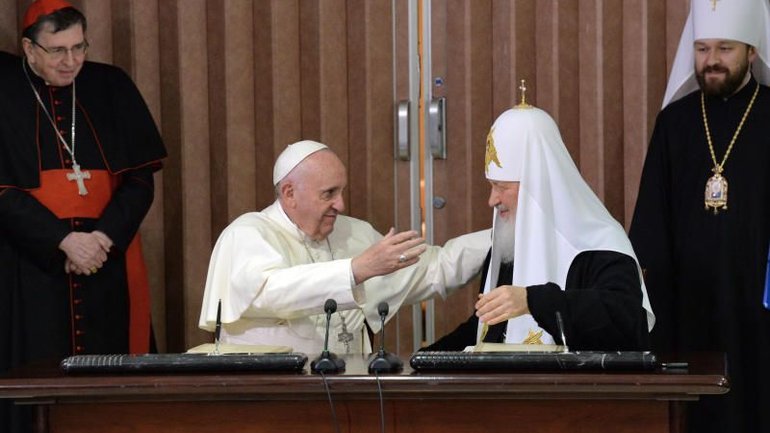
Among the pope's proposals were the reduction of armaments to such a limit that would allow countries to maintain internal order, but not to wage wars among themselves; the creation of international arbitration, which would settle disputes between states based on the rule of law, as well as the introduction of a mechanism of sanctions for those countries that would not agree to the transfer of powers to such an institution or would refuse to recognize its decisions; the free use of the seas; and, finally, the de-occupation of all captured territories. The overarching leitmotif of the address was the idea of "justice" with an emphasis on the fact that the Apostolic See does not seek its own interests, but strives to "preserve complete impartiality towards all warring parties."
It is obvious that these proposals remained a voice crying in the wilderness and did not bring the desired results. However, in its responses to military conflicts in the following decades, the Apostolic See consistently followed the line drawn in the context of the First World War by Pope Benedict XV and Cardinal Pietro Gaspari, the Vatican’s Secretary of State. And practically none of these conflicts lacked diplomatic initiatives on the part of the leaders of the Catholic Church. During World War II, Pope Pius XII sought to mediate between the warring powers, first by working to prevent war and later to facilitate its ending. In 2003, Pope John Paul II tried to avert the US invasion of Iraq and encouraged a diplomatic solution of the conflict. In 2019, Pope Francis actively made efforts to end the armed conflict in South Sudan. However, in the 20th century, the Catholic Church was not the only institution that tried to take on a diplomatic function to bring wars to an end. Religious diplomacy was also one of the aspects of the activities of the World Council of Churches, established in 1948. For instance, through its mediation, the Addis Ababa Agreement was signed to end the civil war in Sudan in 1972.
After Russia's annexation of the Crimean Peninsula and the start of proxy-war in Donbas in February 2014, the Apostolic See tried to play a mediating role in the search for a peaceful resolution of the conflict Russia generated in Ukraine. And Ukrainian leadership for some time considered the Vatican as a possible and desirable platform for negotiations, despite the rather restrained assessment of individual statements and initiatives of the pope. The full-scale invasion of Russian troops into Ukraine in 2022 ruined hopes to achieve the end of the war through negotiations. This, however, has not discouraged religious leaders to continue using diplomatic efforts to stop the bloodshed. Pope Francis, the World Council of Churches, and the Conference of Catholic Bishops of the European Union tried to conduct a dialogue with the Russian political and church leadership. Patriarch Kirill of Moscow remained deaf to these initiatives. He openly and actively supported the "special military operation" by spreading propaganda narratives about the "sacred" nature of the war in Ukraine as a civilizational confrontation with the "immoral and aggressive" West.
Therefore, despite the fact that the diplomatic efforts of certain Church and ecumenical circles were quite active, they did not bring noticeable results. Moreover, some reactions of the Apostolic See to the full-scale Russian aggression against Ukraine provoked a lot of discussion and critical comments both in Ukraine and the whole world. All this compelled an examination of the question of the role, content, and possibilities of religious diplomacy in a new way. Should it remain within the limits of mediation between the victim and the aggressor? Can the current patterns of relations between the Churches and religious leaders remain under the influence of the inertia of the last decades, despite the fact that one of the partners is co-responsible for the instignation of the war? Is diplomacy at all the business of the Church? Or, rather in the context of aggression, should its prophetic voice be heard, which exposes evil and its perpetrators and defends the defenseless and victimized?
There are no ready answers to each of these questions today. We can, however, safely assume that the current war is a global "game changer" and its impact will affect all spheres of life in the modern world, including religious diplomacy. Discussions about the possible trajectories of these changes have been ongoing since the beginning of the Russian invasion, and one of the important stages of this process was the session "Opportunities and Limits of Religious Diplomacy" within the international academic conference "Church Diplomacy and the Religious Dimension of the Russian-Ukrainian War" (Lviv, June 29-30, 2023), organized by the Ukrainian Catholic University in L’viv and the University of Notre Dame (USA) as part of a joint research project. The session brought together representatives of the world of diplomacy, in particular, Jan Tombiński, the EU ambassador to the Apostolic See from 2016-2020, and now the adviser of the Ministry of Foreign Affairs and European Integration of Moldova; and Tamara Grdzelidze, a well-known Orthodox theologian who from 2014-2018 was Georgia's ambassador to the Vatican; as well as researchers Cezary Kościelniak from the Adam Mickiewicz University in Poznań and Rev. Andrij Hlabse, SJ, from the University of Notre Dame in the USA.
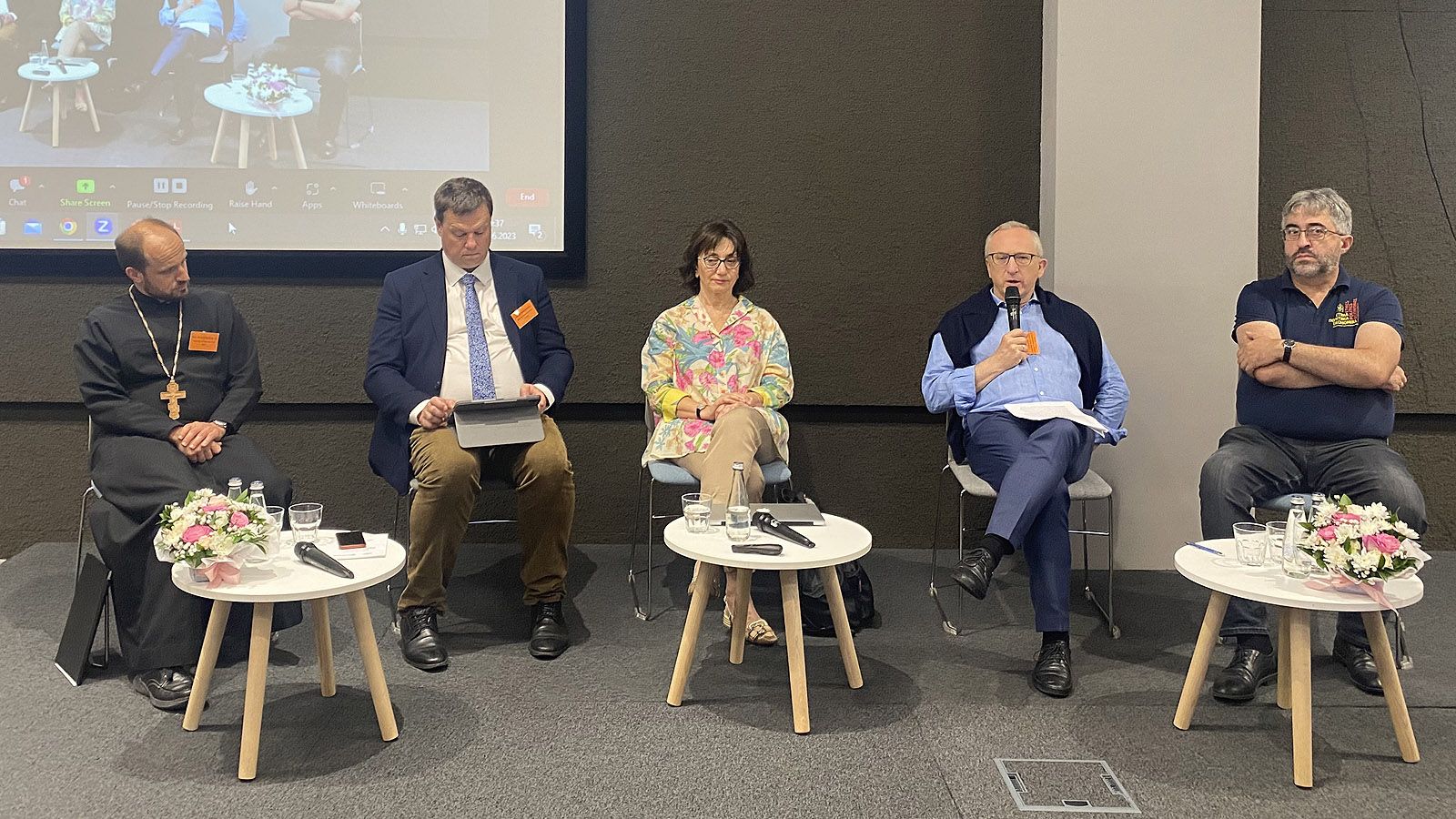
Jan Tombiński opened the session by asking a direct question: "Have the Churches managed to achieve significant success in conflict prevention over the past decades?" According to him, during the First World War, local Churches in various warring countries did not seek reconciliation, but rather justified the actions of their states, which, in their opinion, were waging a "just war." Only Pope Benedict XV tried to reach out to all sides with pleas for an end to the war. The situation changed a little bit during the Second World War: German Protestants mostly supported Hitler's policies, however the Catholic Church became his most influential opponent, though it was a minority Church. This latter position was supported by Pope Pius XII, who was also saving Jews and supported the anti-Nazi movement.
"The problem is that nobody knew this during the war. But this concerns the authority of the Church. People need to see her position. Instead, people did not know, the voice of the Church remained unheard. Because of this, trust in the Church suffered," Jan Tombiński noted.
After the war, the speaker continued, the Catholic Church and famous Catholic political figures became one of the most ardent public promoters of European integration, favouring reconciliation and the establishment of peaceful coexistence among nations. Besides, religious circles tried to continue to work on conflict prevention. One example of such initiatives is the tradition of meetings in Assisi of representatives of various faiths and confessions, established in 1986 by Pope John Paul II. However, this initiative did not have the proper effect, looking, for example, at the the war on the territory of the former Yugoslavia. Tombiński added,
"Different Churches also tried to become mediators to resolve conflicts in Africa. Pope Francis and Archbishop of Canterbury Justin Welby tried to stop, at least temporarily, the conflicts in the Central African Republic, and thus in South Sudan. For me, the most impressive result of these initiatives was the fact that as soon as the representatives of the two Churches tried to encourage local politicians to take the path of finding peace, the latter turned to Yevgeny Prigozhin's "Wagner" PMC to "protect" them. It is really something shocking that in the Central African Republic, in Sudan, in Mozambique, in Mali, in all these places where the Church acted as mediators between the parties to the conflict, "Wagner" spread its influence.”
This showed the limitations of religious diplomacy. Therefore, according to the diplomat, Church leaders should focus on the processes of reconciliation after the end of conflicts because, as history shows, Churches can play an important role in this aspect. One example of such a process is the reconciliation between Germany and Poland. An important aspect of this endeavour was that the call for reconciliation came from the side of the victim, i.e. from the Polish Catholic episcopate.
Finally, the speaker shared a number of universal conclusions that he had drawn from several reconciliation processes in which he had personally participated or observed. First of all, Tombiński emphasized, there is the need for reconciliation with history. And here, each nation must first and foremost take a critical look at its past: "If we are not honest in analyzing our own history, history will strike us. Sooner or later the skeletons will fall out of the closet."
Secondly, the diplomat believes that it is necessary to reach a political consensus between the main political forces in each of the countries seeking reconciliation. The third dimension is to develop an appropriate language for reconciliation, as this process is very sensitive. The next step should be the recognition and protection of leaders who will carry the whole process of reconciliation: "After all, those who will engage in reconciliation will be under attack from irreconcilable representatives of their countries." Next should come the creation of institutions of reconciliation: "Ideas are generated by people, but they last because of institutions." Time is a very important element of the whole peacemaking process, so it is necessary to have patience and work for the long term.
"Finally, there is no just peace without justice that is visible to people. Evidence of all crimes must be collected, and criminals must be punished. Without this, reconciliation will be impossible," Jan Tombiński concluded.
At the beginning of her speech, Tamara Grdzelidze noted that religious diplomacy differs in the Catholic and Orthodox Churches. In the Catholic Church, diplomats receive appropriate education and undergo the necessary training; most of them have doctoral degrees. When they go on diplomatic service in some country, they represent the sovereign Apostolic See, which has a special place in the international community; and it provides, first of all, moral authority. On the other hand, in Orthodoxy, the representatives of the autocephalous Churches involved in diplomatic processes generally do not have special training. In addition, these bishops or priests represent their national Churches and countries and, therefore, bring national interests into this process. These interests, in turn, permeate the Churches. And this, according to the researcher, significantly distinguishes Catholic and Orthodox religious diplomacy.
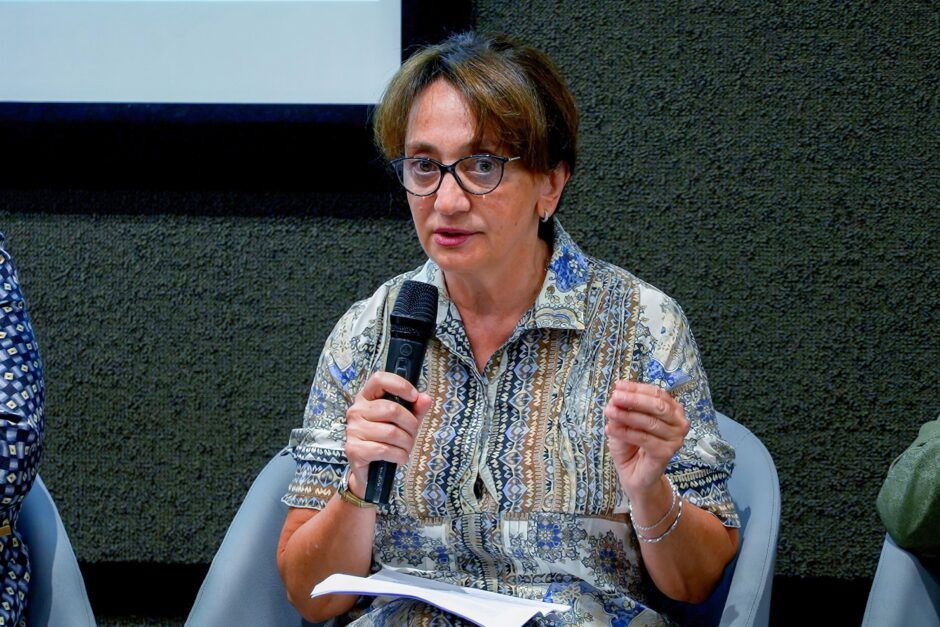
The speaker continued her report by recalling the message of Patriarch Bartholomew at the meeting of the Central Committee of the World Council of Churches (WCC) in June 2023, in which he declared his support for its activities and emphasized the commitment of the Patriarchate of Constantinople to the movement that aims to find “the common ground that allows us to discover our unity in Christ.” At the same time he mentioned the politicization and instrumentalization of the Orthodox Church in Russia, which, according to him, caused irreparable damage to Orthodoxy.
Professor Grdzelidze was quite skeptical about the initiative of the WCC to organize a meeting of representatives of the Orthodox Church of Ukraine (OCU), Russian Orthodox Church (ROC) and Ukrainian Orthodox Church of the Moscow Patriarchate (UOC-MP), which would take place in October 2023 and start a direct dialogue among these ecclesial entities. A problem arises regarding the level of parity of such representatives:
"I specialize in ecclesiology and I do not see three subjects here, but only two – the Russian Orthodox Church and the Orthodox Church of Ukraine. Because even after the council from May 27, there are no signs that the UOC-MP really became independent from Moscow. We are once again in a situation where Moscow is trying to blur the picture. And they use this situation depending on the circumstances. When they need to, they emphasize that the UOC is independent, as we see in this situation. And, when it is not necessary, they emphasize that it is part of the Moscow Patriarchate. However, from an ecclesiological point of view, the head of the UOC is in Moscow," the speaker noted.
In addition, the people who will represent these Churches are not professional diplomats. Tamara Grdzelidze, a former diplomat herself, believes that they do not have sufficient knowledge and skills to conduct negotiations, so they will only defend the positions of their sides. In addition, the autocephalous Churches always stand on their own ground and defend the interests of the political leadership of their own states. "Of course, there is a difference between the Church's relationship with the current government of Ukraine and the relationship between the Russian Orthodox Church and the Russian authorities. The conditions are different, the context is different too. But the fact is that the autocephalous Churches follow the path of their governments. So can the Russian Orthodox Church be an independent player in these negotiations?" The WCC tries to present the announced meeting as a breakthrough in diplomacy; however, in Grdzelidze’s professional opinion, the hopes of the leadership of the WCC for the success of such endeavour do not have sufficient grounds.
A scholar from the Adam Mickiewicz University in Poznań, Cezary Kościelniak, focused his attention on the Eastern European policy of the Vatican. He notes that from the revolution of 1917 until the end of the 1950s, the Soviet government with its atheistic ideology was interpreted in Rome as an enemy of the Church. The situation changed when cardinal Agostino Casaroli began to establish relations with the communist governments behind the Iron Curtain. In the 1960s, a number of agreements were reached with the governments of Hungary and Yugoslavia. The leadership of these countries agreed to the appointment of bishops. The Vatican, in return, guaranteed that Catholic clergy would not interfere in the public sphere. Often these agreements were concluded behind the backs of the local hierarchy and without its approval. These provoked conflicts between local bishops and Vatican diplomats, as happened, for example, with the opening of the nunciature in Warsaw in 1975.
The situation changed after the election of cardinal Karol Wojtyla as Pontiff. The new pope understood well that the Soviet system was not capable of reform. Rather like Leviathan it would seek to expand its influence and power to the smallest places where manifestations of freedom existed. He was also aware that the communist regime was promoting its own version of "cancel culture" and trying to destroy Christian spirituality, a policy which endangered the existence even of the catacomb Churches. Therefore, during the pontificate of John Paul II, the Vatican began more actively to support “illegal” clergy behind the Iron Curtain. Vatican geopolitics also underwent a change. The Slavic Pope believed that language and culture are the basis of the independence of nations. So, during his numerous pilgrimages to different countries, he often spoke to believers in their own language. He also insisted that all nations, even those considered stateless and "non-historical," should be guaranteed the right to self-determination.
Prof. Kościelniak noted that the collapse of communism also meant the collapse of Cardinal Casaroli's Ostpolitik. At the beginning of the new millennium, however, its echoes began to be heard. From the beginning of his pontificate, Pope Francis paid a lot of attention to interreligious dialogue for world peace. He tried to develop partnership relations with Patriarch Kirill, an effort that had its culmination in their meeting at the Havana airport. This initiative continued even after the Russian invasion of Georgia, the war in Syria, and the annexation of Crimea, which clearly indicated the imperialist appetites of the Putin regime. According to the scholar, papal diplomacy has undergone changes compared to the times of John Paul II. These changes can be characterized as "neo-Casarolism", since, as in the previous era, the Vatican tries to "find compromises where there cannot be any." "First of all," the researcher insists, "in the encyclical Fratelli tutti, Pope Francis renounced the doctrine of a just war. And this has serious consequences. If there are no just wars, then both sides are equally guilty, equally responsible for the war." "When there is no doctrine of a just war," the speaker continues, "then there are no criteria for determining who is the aggressor and who is the victim." Another change in the diplomacy of the Apostolic See was the spread of the thesis that the war should be stopped at any cost. According to Cezary Kościelniak, this idea could have been suggested to the Pope by the leadership of the Community of Sant'Egidio represented by Professor Andrea Riccardi, who even proposed to surrender Kyiv to the Russians. "If Riccardi's proposal had been implemented, the Russians would have been in L’viv, and the peace achieved in this way would not be just, but also would not be a peace at all," concluded the scholar from Poland.
The question of the attitude of the Apostolic See to Russia's war against Ukraine was continued in his paper by Rev. Andrij Hlabse from the University of Notre Dame. At the beginning of his presentation, he noted that the Church is a special institution, or at least has a special understanding of its identity unlike other communities in this world. Such peculiarity of the Church is due to its origin. The Church is neither a political nor an ethnic association, but a community created by God himself. Therefore, the analysis of the actions of the Church should proceed, first of all, from a theological perspective. It is from this point of view, according to Rev. Andrij Hlabse, that one should consider the position of the Vatican on issues of war and peace, and in particular on the principle of acting "super partes" (above all parties of the conflict), which is followed by papal diplomacy.
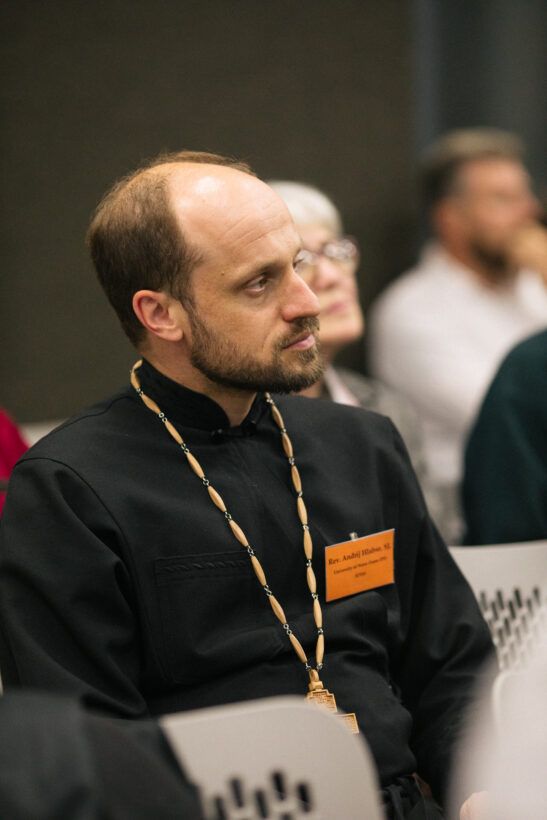
This principle of acting "super partes," the speaker explained, should not be understood just as a "negative quality," because the Church participates in the diplomatic process not simply as a party that is not directly involved in the conflict, but rather as a different type of participant. "Its unique self-awareness as a community, united by the Creator and called to deepen unity with God and among people, gives a distinct ‘positive quality’ and motivates the involvement of the Apostolic See in diplomacy as an impartial agent. After all, the Church is not and cannot be tied to the specific interests of any state, nation, or ethnic group. It strives to present something more transcendental," emphasized Rev. Andrij Hlabse.
At the same time, her detachment is not equivalent to moral neutrality: "On the contrary, it is the Church's political neutrality – its distance from purely earthly goals, interests and benefits – that should be an instrument that increases the Church's ability to act with greater freedom in favor of moral and humanitarian principles." Thus, in the speaker's opinion, Сhurch diplomacy can be an authentic Сhurch ministry, appropriate to the nature and mission of the Church. It is not a simple addition to its activities or interference in a sphere in which it should not be involved. That is why the Church can become the instance of last resort in the matter of reconciliation of seemingly irreconcilable parties.
At the same time, Russian aggression against Ukraine is a difficult "limit case" for the diplomatic mission of the Apostolic See. Since the Russian invasion challenges fundamental moral foundations and democratic principles, it is impossible to maintain neutrality regarding the parties of the conflict without undermining the principles that nourish the Church's presence in this sphere. According to Rev. Andrij Hlabse, at least three areas should be highlighted where this problem is most obvious. First, the Catholic Church has been openly advocating for human rights in the international level for decades. The Church cherishes human rights as compatible with Christian teaching and see them, in a certain sense, as a product of it. That is why the advocacy and protection of these rights is the pillar on which Vatican diplomacy is built. As can be seen in the context of the war against Ukraine, the violation of basic human rights, especially among the civilian population, is used as an evident element of the strategy of total war only by one side.
Another aspect of this war that calls into question the credibility of the "super partes" approach relates to the role of religion in modern Russian ideology. Ideology, which, according to the speaker, stems from the chauvinistic, ethnocentric and nationalist perversion of East Slavic history and distorted relations between the Church and the state, where the former reinforces the expansionist ambitions of the latter. According to the American theologian, Patriarch Kirill's support and justification of the war, as well as the promotion of the ideas of the "russkiy mir" is a "gross and blasphemous distortion of the Christian faith," and therefore requires a full exposure of the evil that is done in the name of God.
Next, Rev. Andrij Hlabse observed that in this war there is only one side that is the target of genocidal attacks both at the level of rhetoric and action. "In the event that a group is subjected to genocide, even if on both sides of the conflict there are Christians or members of any other religious community, the Church, whose presence in the diplomatic sphere is dictated by a spiritual and moral mission, is obliged to immediately and unequivocally come to the defense of the community that suffers from genocide," the speaker emphasized. In addition, the position of acting "super partes" can unwittingly contribute to the legitimization of the aggressor's criminal actions, giving him a place at the negotiating table as a seemingly "equal partner, but with different views." This would only play into the hands of the criminal, as it would add weight to his position on the diplomatic level and expand the possibilities for manipulation in the information sphere.
At the end of his report, the researcher emphasized again that although the "super partes" approach to diplomatic relations derives in a special way from the identity and mission of the Church and often functions well, the specific characteristics of Russian aggression against Ukraine call into question the adequacy of this approach as a universal practical method. "Dramatic 'limit cases', as a rule, draw more clearly the contours of the fundamental values at stake, and I would argue that this war does that with the main characteristics of church diplomacy," Rev. Andrij Hlabse concluded.
Taking the first voice in the discussion after the presentations, Jan Tombiński noted that one should not pay too much attention to the religious aspects of Russian aggression against Ukraine, because, in his opinion, it has nothing to do with religion: "This is a purely colonial Russian war in Europe. Religion is used only as one of the tools to mobilize people, to somehow explain to them what is happening." The next question follows from this statement: "How should Churches talk to bandits?" The ambassador tried to answer this by referring to the history mentioned by Prof. Elena Volkova on the previous panel, of Julius Streicher, the editor of newspaper "Der Stürmer" during the Third Reich. This was perhaps the worst example of Nazi xenophobic propaganda. Jan Tombiński agreed with Prof. Volkova’s dramatic conclusion that a similar fate awaits the leaders of the Russian state and the Russian Church. Therefore, what can be negotiated with Hitler? Is it even worth negotiating with such people and conducting public diplomacy with those who commit genocide? – the experienced diplomat asked rhetorically. In his opinion, this is a serious problem of the current papal curia. Another manifestation of this problem is that since the beginning of the war, the voice of the Roman Catholic Church in Russia has not been heard at all. There has been no public appeal. The discussant also considers appeal of Vatican diplomacy to the tradition of "not mentioning the names of states" to be unconvincing. After all, it was not always like that. For instance, the encyclical "Mit brennender Sorge" can be mentioned. "Nowadays we are dealing with such a pure and clear example of an aggressive war, and still the Church hides behind the walls of tradition in order to maintain neutrality," Jan Tombiński stated with regret, supporting the point of Rev. Andrij Hlabse that there can be no moral neutrality in such cases.
For his part, the Notre Dame scholar reiterated his thesis that religion does have some relation to this war, since the historical narratives used by the Putin regime to justify its imperialism also have a religious aspect: "Russia's interpretation of history is an imperial interpretation, but part of what is interpreted is church history." Therefore, he believes that it could be said that true religion has nothing to do with this war, but we cannot avoid the discussion about the role of religion in this war, since the Russian government uses both the Church and Church history in its imperial propaganda.
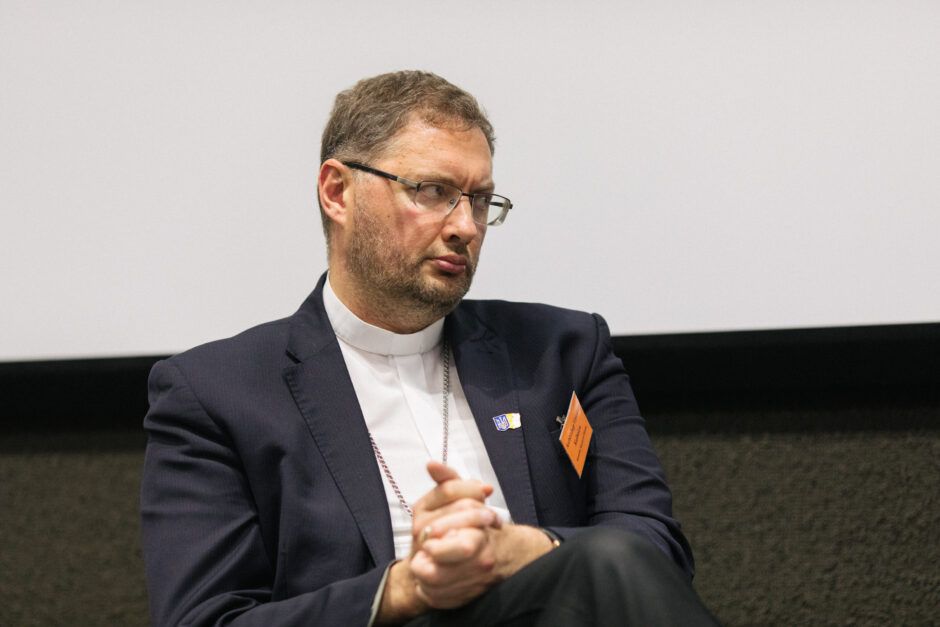
Responding to the papers of the speakers, Archbishop Visvaldas Kulbokas, the Apostolic Nuncio to Ukraine, drew attention to the fact that in certain situations he had to turn to the Vatican Secretariat of State in order to negotiate with the Russians about humanitarian corridors and the evacuation or transportation of necessary things, as was the case in Mariupol. And this occurred at the request of the Ukrainian side. "Therefore, it is important for us not to cut all channels. In my understanding," the papal ambassador stated, "Pope Francis believes that it is better to be accused by the Ukrainians that he did not say enough, but to remain, at least potentially, useful in solving humanitarian issues."
Finally, the discussion touched on the question of what should be the reaction of Church diplomats in the case of open propaganda and constant lies. Rev. Andrij Hlabse believes that two groups of communicators can coexist in the Church, one of which will use direct language in relation to such a partner, while others will use more careful language in order to maintain the contact: "There must be coordination so that the truth is not harmed and the door for conversation won’t be finally closed." However, in his opinion, sooner or later there will be a problem with how long you can have a conversation with a partner who does not even hide his dishonesty. It would be extremely hard to do so without losing credibility and without ruining the goals you set: "There are situations, when malice or dishonesty is not overt, public, and there is time to wait and see if anything comes out of this dialogue. But when this dishonesty is obvious, the question clearly arises, how long can you talk with such a partner without losing your credibility."
According to Jan Tombiński, Church officials should not be overburdened with all possible tasks, including the fight against propaganda. "However, even in the Church sometimes they forget that in the beginning there was the Word. And if we don't call a spade a spade, we end up losing people's trust. They become confused, do not understand what is happening. "Let your word be ‘Yes, Yes’ or ‘No, No’" (Mt 5:37). And this is what the Churches lack today," concluded the Polish and European diplomat.









